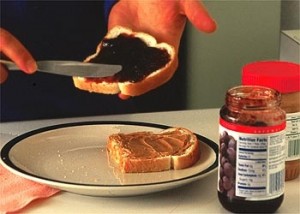Is This Fast Enough?
 My favorite food is peanut butter. I eat it every day. I don’t need bread or jelly—I eat it from the jar with a spoon.
My favorite food is peanut butter. I eat it every day. I don’t need bread or jelly—I eat it from the jar with a spoon.
Every year I think about quitting during Lent but I never do. Like an addict, I cannot think about life without peanut butter but I know life cannot go on this way. Same thing with coffee. Heaven help the fool in my crosshairs on a morning when something—broken alarm clock, absent-mindedness, an act of Congress—prevents me from ingesting my black crack. Because when it comes to my coffee I’m the same as with the peanut butter: I’m a purist. Black and raw, straight from the percolator. Coffee is coffee. Put something else in it, cream, sugar, Amaretto, and it becomes a cocktail. Not my cup of tea.
We are now in the final days of Lent. During this penitential season—lived out by Catholics across the globe—we are encouraged to sacrifice in preparation for Easter Sunday, the greatest reality, that of Christ Jesus rising from the dead. Sacrifice means giving up and letting go, of making more room in my life for the Spirit, so that I can develop a closer, more personal relationship with the Lord. Anything that gets in the way is a barrier not a bridge.
But is Lent always about food? Mostly, yes. But maybe another form of sacrifice is to change the way I think about God, to think my way into right action if not to act my way into right thinking. Both go hand in hand. Fasting lightens the load and abstinence, especially from meat on Friday, gives strength to complete the journey.
What is important is the reason for the sacrifice. Suffering for the sake of suffering only makes a person miserable and everybody else too.
Fasting and abstinence, a law in the Church, has been with us for many years because it works. It reminds us of our hunger, our need, for God. Nothing gets in the way: not alcohol, too much food, or other material comforts.
During Lent we pray better and listen to God because there are less distractions. Holy men and woman—Mary Magdalene, Catherine of Sienna, Thomas Aquinas, Turibius of Mongrevejo and many more—have always known this.
There is much wisdom and flexibility in Lent. Pope Paul the Sixth says that fasting must be according to our state in life, our age, and our capability. Ultimately it is between me and God. I don’t have to quit my favorite food but it helps to change my perspective. There is more to peanut butter than PB&J sandwiches.
For example, did you know that peanut butter can clean leather and fix damaged DVDs? (I’m not making this up!) It can remove chewing gum from hair and if you have a barking dog, place an open jar of peanut butter on the floor and you will have peace and quiet. And gentlemen, if you run out of shaving cream go into the kitchen and reach for that jar of Jiff on the shelf. The oil in the nuts is good for the skin.
Lent takes disciple and a change of perspective. A spiritual fast helps us discern God’s calling and a physical fast helps us to do God’s will. Most important: a sacrifice is for sanity and not for vanity. It does not behoove me to grow annoyed when the needle on the scale hasn’t budged much since Ash Wednesday. Two tablespoons of peanut butter has 200 calories and I’m eating it twice a day, for breakfast and for lunch, and after dinner to substitute for the desert I gave up.
If you think you can’t live without something then maybe God is calling you to give it up.

